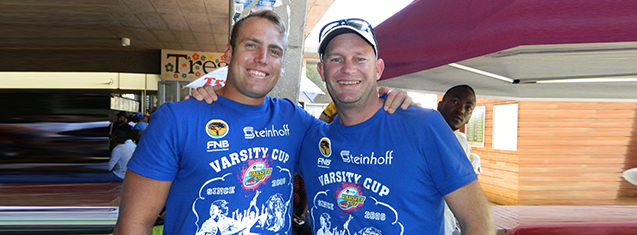
Kovsies! Are you ready?
It’s that time of the year again when Mondays mean rugby that rocks!
On Monday 9 February, the UFS Bloemfontein Campus will again be bustling with supporters as our Shimlas kick off their 2015 Varsity Cup rugby campaign against the University of Pretoria Tuks.
Students have already been made aware of Varsity Cup excitement during an activation event held at the Thakaneng Bridge on the Bloemfontein Campus on Wednesday 4 February. During this event, the Shimlas captain, AJ Coertzen, introduced his team while KovsieSport held promotional competitions.
New Shimlas coach, Franco Smith, is hoping to transfer his European coaching experience to the UFS first team as he heads into his debut Varsity Cup season. Smith previously held the head coach position at the Pro12 club, Benetton Treviso, between 2007 and 2013.
On the other hand, Tuks are likely to be very determined to bounce back in this year’s Varsity Cup season after missing out on the play-offs as defending champions in 2014.
Therefore, the Shimlas’ debut Varsity Cup match this year should be packed with excitement, thrills, and good old-fashioned running rugby to entertain the student population. Speaking of entertainment, there should be loads more of that happening next to the field during the half-time and strategy breaks.
So Kovsies, don’t miss the first of many great upcoming Shimlas home matches on Monday 9 February at 18:30, only at Shimla Park.